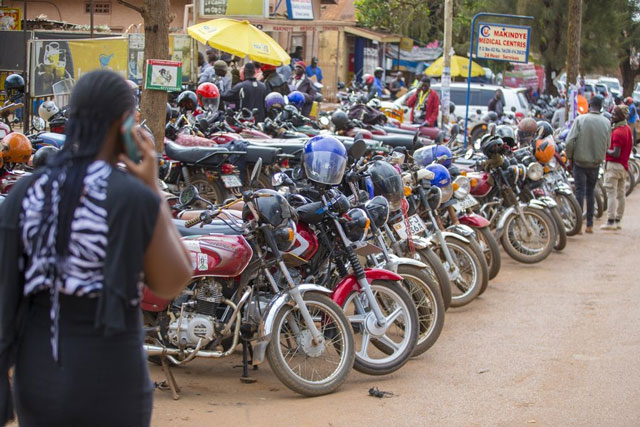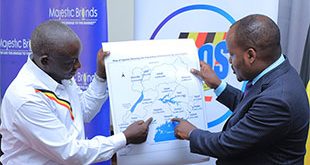
Kampala, Uganda | THE INDEPENDENT | Boda Boda riders have explained the recently released data which showed that only a small number of them had driving permits and logbooks to prove eligibility to ride on the roads and the ownership of the motorcycles.
The report released by the State Minister for Kampala Kabuye Kyofatogabye indicates that out of 42,000 riders recently counted by Kampala Capital City Authority- KCCA, only 157 met all the requirements of the job and hence had permits, insurance cover, logbooks, PSV license and National Identity Cards.
The report showed that 94 percent, making 39,480 of the counted riders had no driving permits and insurance cover, 73 percent making 30,660 had no Logbooks, 98 percent making 41,160 had no PSV license and 234 had no National IDs. The minister used these statistics to explains the Boda Boda mess in the City and the road crashes involved.
“The kill rate of productive Ugandans due to Boda Boda disorder is over 50 percent, the City mortuary receives up to 40 bodies a day from boda boda related accident,” said Minister Kyofatogabye
Uganda Radio Network talked to a number of riders to establish why there is a small number of them possessing the listed requirements.
Umar Isabirye, a Boda Boda rider and Chairman Boda Boda Industry Makindye division says that the lack of a proper system for people seeking to join the industry and poor enforcement mechanism of requirements, explains why only a few riders have driving permits. Isabirye says that many people have only learnt to ride and taken to the road in a few days without taking time to acquire the other items that make them eligible for the job.
Apart from the ignorance of riders, Isabirye says that the fees to process a driving permit are too high for many riders to afford.
Boda Boda riders are required to have Class One permits of which, a year’s license is issued at 55000 shillings, three (3yrs) licenses at 150,000 shillings and five years license at 250,000 shillings.
A few months ago, the government through the Minister for Works and Transport Katumba Wamala promised to reduce the fees to get permits for riders who pass through the training system organized by government. The fees would be reduced to 27,500 for a year’s permit, 75,000 shillings for a three year’s permit and 12,5000 shillings for a five year’s permit.
But this promise is yet to be met. In his last communication on the matter, the Minister said they were preparing for the proposal to be tabled before cabinet and forwarded to parliament for approval before it can be implemented.
Isabirye says that subsiding on permits and proper enforcement by traffic officers is the clearest way to get riders acquire permits.
Another mind-boggling statistic issued by KCCA was that 30,660 counted riders had no Logbooks to prove their ownership. Like with other locomotives such as cars, the Uganda Revenue Authority issues a logbook for every motorcycle that is purchased, and the same can be transferred to another person once the initial owner decides to sell the motorcycle.
KCCA and Police has often held a thinking that riders who don’t possess logbooks are likely to have acquired the motorcycles through mischievous means, such as stealing or buying from the thieves.
But Godfrey Ojiambo from Northern Bypass stage in Kawempe division disagrees saying that several of the riders don’t own the motorcycles they use but rather acquire them from their bosses or companies like Tugende on loan.
During the recent census exercise, motorcycle owners were asked to come along during registration and that companies too come along or issue their riders documents to prove that they possess logbooks but this was largely if not entirely defied.
Ojiambo explains that it is difficult for a person who entrusts a rider with a motorcycle, usually referred to as the boss, to also surrender the logbook and similarly, companies that loan out motorcycles to issue logbooks not until the rider has cleared the loan.
Ojiambo himself says that he acquired a motorcycle through a loan financed for two years, before he gained full ownership of the same two years back. The first two years when he was servicing a loan, he says that he had no access to the logbook.
Relatedly, Ojiambo says that there are more riders than motorcycles at the different stages as they share motorcycles to make a living. He explains that at his stage, there are over 100 riders but less than 25 percent have log books and this is because the remaining don’t own the motorcycles they ride or are using colleagues’ motorcycle. Like it is with taxis, there could be more than one rider per motorcycle. One works up to 2pm, another up to 7pm and the last one, up to late in the night.
Ojiambo proposed to government that focus be put on registration and training of Boda Boda riders who can be identified by their leaders and originating from a particular stage.
For the number of accidents and the lack of third-party insurance, the riders say the challenge is with knowing the relevance of training in road safety and also question the relevance of getting a third-party insurance. But that’s not enough, the riders say it is on rare occasions that they have had of a third-party insurance benefiting a rider. Although it is supposed to cover an individual against a loss or damage caused by another driver, they say the process for claims is tedious and that often the accidents are blamed on the riders.
Regarding the number of people who die every day in Kampala from Boda Boda related accidents, the riders agree there is reckless driving but question the figures provided. Siraje Mutyaba the Kampala District Boda Boda Industry Chairman says that the quoted number is way too high, and if it were true, they would equally have felt the impact in the Industry, losing their colleagues in tens every day.
Putting aside the riders’ views, the KCCA figures are far beyond what is reported in the Annual Police Crime Report .2021 Police report shows that in 2021, there were 4159 accident fatalities across the country. This means that 346 people died in accidents every month and 11 per day. KCCA’s figures would mean that from 40 people a day, and that’s for only Boda Boda related accidents, a month, the number would be 1200 and annually, 14,400.
This would mean that Boda Boda related accidents alone kill three times more people than the general accident related deaths reported by police annually country wide. And yet, the police report shows that although there are more accidents reported in Kampala and the Metropolitan, 78 percent of the fatalities occurred outside this area of Kampala.
Mutyaba however agrees that Boda Bodas are to blame for some accidents in the city and hence asked government to design a clear training system for every rider to undergo before joining the industry.
Currently there is an ongoing training exercises sanctioned the government and is being conducted by nine selected training schools which are; Uganda Driving Standard Agency (UDSA), Wefunille, Harus, Prestige, J&K, BK Transpoint, Country View, Tamale’s and Jet Riders Driving Schools.
The riders have however not responded to the call yet, arguing that the process might be abandoned midway like the earlier ones. Mutyaba says that Government needs to come out with one voice from the different implementing agency and a clear end game spelt out if they are to attract riders to per take of the program.
*****
URN
 The Independent Uganda: You get the Truth we Pay the Price
The Independent Uganda: You get the Truth we Pay the Price



